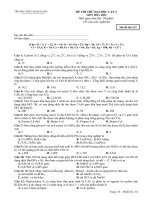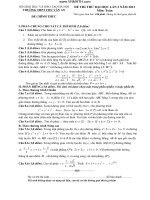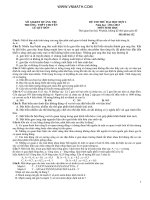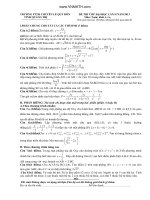đề thi thử đại học đợt 2 năm 2013 và đáp án môn tiếng anh - chuyên lê quý đôn
Bạn đang xem bản rút gọn của tài liệu. Xem và tải ngay bản đầy đủ của tài liệu tại đây (196.84 KB, 7 trang )
!"#$%&#$'()#*+#, /#0#1234#5678#9#:;<=#>?@ABCD#EFG#HIJK#LMN1O#P@QRST#UVWX#Y## Z[\]^#_`7#
SỞ GD-ĐT QUẢNG TRỊ
TRƯỜNG THPT CHUYÊN LÊ QUÝ ĐÔN
ĐỀ THI THỬ ĐẠI HỌC ĐỢT 2 NĂM 2013
Môn thi: TIẾNG ANH (khối A1, D)
(Đề thi gồm có 7 trang)
Họ và tên: …………………………………… Số báo danh: ………………………………………
Học sinh lớp: ……………………………… Trường: …………………………………………
ĐỀ THI GỒM 80 CÂU (TỪ QUESTION 1 ĐẾN QUESTION 80)
Read the following passage and mark the letter A, B, C, or D on your answer sheet to indicate the
correct answer for each of the blanks.
THE RUINED TEMPLES OF ANGKOR
The ruined temples of Angkor are perhaps one of the most impressive Seven Wonders of the World.
Located in modern day Cambodia near Lake Tonle Sap, the largest freshwater lake in Asia, Angkor was the
seat of power for the Khmer Empire from the ninth to the most impressive ones in the world, rivaling the
pyramids of Giza in Egypt. Why this mighty civilization died out is a question that archeologists are now only
beginning to ponder. The answer, it turns out, may be linked with the availability of fresh water.
One possible explanation for the downfall of the Khmer Empire has to do with the inhabitants’
irrigation system. The temple and palaces of Angkor were constructed around a series of artificial reservoirs
and canals which were annually flooded to capacity by the Mekong River. Once filled, they were used to
irrigate the surrounding rice patties and farmland during the course of the year. Farmers were completely
dependent upon the water for their crucial rice crop. Without consistent irrigation, the farmers would have
been unable to maintain functional crop production.
Scientists speculate that toward the end of the Khmer Empire the hydraulic systems of the reservoirs
and canals broke down. The construction of hundreds of sandstone temples and palaces required an
enormous amount of physical labor. In addition, as the capital of the Khmer Empire, Angkor contained
upwards of one hundred thousand people who resided in and around Angkor. In order to feed so many
people, the local farmers were driven to grow food quicker and more efficiently. After centuries of continual
use, the irrigation system was pushed beyond its capacity. Soil erosion, nutrient depletion, and the loss of
water led to decrease in the food supply. With less food available, the people of Angkor slowly began to
migrate to other parts of Cambodia thus leaving the marvellous city of Angkor to be swallowed by the jungle.
Therefore, it is speculated that the Khmer Empire may have fallen victim to its own decrepit infrastructures.
Question 1: What is the passage mainly about?
A. A possible explanation for the decline of a civilization.
B. Modern day agricultural procedures in Cambodia.
C. The essential role water plays in farming.
D. Religious temples of the ancient Khmer Empire.
Question 2: What does the passage preceding most likely discuss?
A. Architecture of ancient Asian civilization.
B. The form of government practiced by the Khmer Empire.
C. Religious practices of the people of Angkor.
D. The other six wonders of the world.
Question 3: According to the passage, Lake Tonle Sap in Cambodia ______.
A. is an enormous fresh body of water in Asia
B. is one of the Seven Wonders of the World
C. was unable to supply enough fish for the people of Angkor
D. became polluted due to a population explosion
Mã
đ
ề
:
268
www.DeThiThuDaiHoc.com
www.DeThiThuDaiHoc.com
!"#$%&#$a()#b+#, c#0#1234#d678#9#:e<f#>g@AhCi#Ejk#HlmK#nMo1O#p@qrsT#tVuv#Y## wxyz{#|`7#
Question 4: The word ‘seat’ is closest in meaning to ______.
A. battle B. chief C. location D. summit
Question 5: Why does the author mention the hydraulic systems of the reservoirs?
A. They supplied irrigation from the Indian Ocean.
B. They were destroyed by nearby warrior tribes.
C. They became non-functional due to overuse.
D. They helped transport the sandstones for constructing temples.
Question 6: The word ‘reservoirs’ could best be replaced by ______.
A. dams B. lakes C. rivers D. wells
Question 7: The word ‘they’ refers to ______.
A. reservoirs and canals B. temples and places
C. rice patties D. farmland
Question 8: It can be inferred from the passage that the inhabitants of the Khmer Empire ______.
A. depended upon rice as their main source of food
B. lost their food source due to excess rainfall
C. were intentionally starved by the farmers
D. supplemented their diets with meat hunted in the nearby jungles
Question 9: All of the following are mentioned as events that can affect food supply EXCEPT ______.
A. reduction of nutrients B. loss of water supply
C. erosion of soil D. contamination of soil
Question 10: The word ‘decrepit’ is closest in meaning to ______.
A. beneficial B. incomplete C. disorganized D. deteriorated
Mark the letter A, B, C, or D on your answer sheet to show the underlined part that needs correction.
Question 11: If they (A) took their language lessons (B) seriously, they (C) would be able to communicate
(D) with the locals now.
Question 12: Doctors have (A) always recommended that a person with a cold (B) must drink fluids, (C)
such as juice or water to (D) prevent the loss of water in his/her body.
Question 13: We felt (A) asleep (B) at the meeting (C) because the speaker had (D) such a monotonous
voice.
Question 14:
Champagne (
A
)
is
(
B
)
a traditional beverage
(
C
)
to serve
on New Year's Eve (
D
)
and New
Year's Day
.
Question 15: It is (A) the writing English (B) that causes (C) difficulties to (D) foreigners.
Read the following passage and mark the letter A, B, C or D on your answer sheet to indicate the
correct word for each of the blanks.
In recent years, there has been a remarkable increase in research into happiness. The researchers
have (16) ______ a number of factors which contribute to a definition of happiness.
First of all, there is, in some people, a moderate genetic predisposition to be happy, in other words,
happiness (17) ______ in families. And happiness seems to correlate quite strongly with the main dimensions
of personalities: extroverts are generally happier, neurotics are less so.
Second, people often (18) ______ good social relations as a reason for their happiness. In particular,
friends are a great (19) ______ of joy, partly because of the agreeable things they do together, partly
because of the way friends use positive non-verbal signals such as caressing and touching, to affirm their
friendship. Marriage and similar (20) ______ relationships can also form the basis of lasting happiness.
Third, job satisfaction undoubtedly (21) ______ overall satisfaction, and vice versa – perhaps this is
why some people are happy in boring jobs: it works in both ways. Job satisfaction is caused not only by the
essential nature of the work, but also by social interactions with co-workers. Unemployment, on the contrary,
can be a serious cause of unhappiness.
www.DeThiThuDaiHoc.com
www.DeThiThuDaiHoc.com
!"#$%&#$}()#~+#, •#0#1234# 678#9#:!<"#>#@A $ C % #E'( #H)*K#+M-1O#.@/01T#3V45 #Y## 6789:#;`7#
Fourth, leisure is important because it is more under individual (22) ______ than most other causes of
happiness. Activities (23) ______ sport and music, and participation in voluntary work and social clubs of
various kinds, can give great joy. This is partly because of the (24) ______ themselves, but also because of
the social support of other group members – it is very strong (25) ______ the case of religious groups.
Question 16: A. fallen back down B. gone in for C. come up with D. got down to
Question 17: A. runs B. arrives C. goes D. descends
Question 18: A. explain B. prefer C. talk D. report
Question 19: A. source B. origin C. base D. meaning
Question 20: A. near B. tight C. close D. heavy
Question 21: A. consists of B. applies to C. counts on D. contributes to
Question 22: A. check B. power C. choice D. control
Question 23: A. so B. such C. like D. thus
Question 24: A. facilities B. activities C. exercises D. amenities
Question 25: A. by B. for C. in D. with
Mark the letter A, B, C, or D on your answer sheet to indicate the word or phrase that is CLOSEST in
meaning to the underlined part in each of the following questions.
Question 26:
He was one of the most
outstanding
performers at the live show last night.
A.
easy-looking
B.
important
C.
well-known
D.
impressive
Question 27: I told you clearly and definitely not to write your answers in pencil, Smith!
A. considerably B. thoroughly C. altogether D. specifically
Question 28: He was asked to account for his presence at the scene of crime.
A. complain B. exchange C. explain D. arrange
Mark the letter A, B, C, or D on your answer sheet to indicate the sentence that is CLOSEST in
meaning to each of the following questions.
Question 29: The police asked Mr. Porter many questions about exactly where he was on the night of his
wife’s murder.
A. Where exactly Mr. Porter was on the night of his wife’s murder was of great importance to
the police, who asked him many questions.
B. The police asked Mr. Porter many questions in relation to his exact whereabouts on the
night of his wife’s murder.
C. Mr. Porter was nowhere to be found on the night of his wife’s murder, so the police asked
him many questions.
D. The police had difficulty asking Mr. Porter questions about exactly where he was on the
night his wife committed murder.
Question 30: Tom should have admitted his mistake because the company usually gives employees another
chance.
A. The company might have given Tom a second chance if he had admitted his mistake.
B. On second thought, Tom admitted his mistake because the company usually gives
employees another chance.
C. It is likely that the company will give Tom a second chance despite his mistake.
D. The company will hardly give Tom a second chance because he doesn’t admit his mistake.
Question 31: There were over two hundred people at Carl's trial, most of whom believed that he was not
guilty of the crime.
A. Carl had not committed the crime, and so more than 200 people came to his trial to show
their support.
B. When it was announced that Carl had been found not guilty of the crime, there were over
200 people in the audience at his trial.
www.DeThiThuDaiHoc.com
www.DeThiThuDaiHoc.com
!"#$%&#$=()#?+#, @ #0#1234# 678#9#:!<"#>#@A $ C % #EB( #H)*K#+MD1O#.@/0ET#GV45 #Y## H7IJ:#K`7#
C. Over 200 people coming to Carl’s trial must have influenced the fact that he was not found
guilty of the crime.
D. The majority of the more than 200 people at Carl’s trial didn’t think that he had committed
the crime.
Question 32: These new machines have put an end to queuing.
A. These new machines have a special function in putting an end to queuing.
B. Putting an end to queuing depends on these machines.
C. People have to queue before these machines.
D. Before these new machines were invented, people had to queue.
Question 33: Your chances of being affected by eye strain and back injury increase with the amount of time
you spend in front of a screen.
A. You shouldn’t spend time in front of a screen because you will be affected by eye strain and
back injury.
B. Spending time in front of a screen will affect your eyes and back badly.
C. The more time you spend in front of a screen, the more likely you are to suffer from eye
strain and back injury.
D. Eye strain and back injury are the consequences of spending much time in front of a screen.
Mark the letter A, B, C, or D on your answer sheet to indicate the word or phrase that is
OPPOSITE in meaning to the underlined part in each of the following questions.
Question 34:
If you are
at a loose end
this weekend, I will show you round the city.
A.
free
B.
confident
C.
occupied
D.
reluctant
Question 35: The clubs meet on the last Thursday of every month in a dilapidated palace.
A. neglected B. regenerated C. furnished D. renovated
Read the following passage and mark the letter A, B, C, or D on your answer sheet to indicate the
correct answer to each of the questions.
Newspaper publishers in the United States have long been enthusiastic users and distributors of
weather maps. Although some newspapers that had carried the United States Weather Bureau's national
weather map in 1912 dropped it once the novelty had passed, many continued to print the daily weather chart
provided by their local forecasting office. In the 1930's, when interest in aviation and progress in air-mass
analysis made weather patterns more newsworthy, additional newspapers started or resumed the daily
weather map. In 1935, The Associated Press (AP) news service inaugurated its WirePhoto network and
offered subscribing newspapers morning and afternoon weather maps redrafted by the AP's Washington,
B.C., office from charts provided by the government agency. Another news service, United Press
International (UPI), developed a competing photo-wire network and also provided timely weather maps for
both morning and afternoon newspapers. After the United States government launched a series of weather
satellites in 1966, both the AP and UPI offered cloud-cover photos obtained from the Weather Bureau.
In the late 1970's and early 1980's, the weather map became an essential ingredient in the redesign
of the American newspaper. News publishers, threatened by increased competition from television for
readers' attention, sought to package the news more conveniently and attractively. In 1982, many publishers
felt threatened by the new USA Today, a national daily newspaper that used a page-wide, full-color weather
map as its key design element. That the weather map in USA Today did not include information about
weather fronts and pressures attests to the largely symbolic role it played. Nonetheless, competing local and
metropolitan newspapers responded in a variety of ways. Most substituted full-color temperature maps for the
standard weather maps, while others dropped the comparatively drab satellite photos or added regional
forecast maps with pictorial symbols to indicate rainy, snowy, cloudy, or clear conditions. A few newspapers,
notably The New York Times, adopted a highly informative yet less visually prominent weather map that was
specially designed to explain an important recent or imminent weather event. Ironically, a newspaper's
richest, most instructive weather maps often are comparatively small and inconspicuous.
www.DeThiThuDaiHoc.com
www.DeThiThuDaiHoc.com
!"#$%&#$M()#O+#, @ #0#1234# 678#9#:!<"#>#@A $ C % #EQ( #H)*K#+MS1O#.@/0TT#VV45 #Y## W7XY:#Z`7#
Question 36: What does the passage mainly discuss?
A. The differences between government and newspaper weather forecasting in the United States.
B. The history of publishing weather maps in United States newspapers.
C. A comparison of regional and national weather reporting in the United States.
D. Information that forms the basis for weather forecasting in the United States.
Question 37: The word ‘resumed’ is closest in meaning to ______.
A. began again B. held back C. thought over D. referred to
Question 38: According to the passage, one important reason why newspapers printed daily weather maps
during the first half of the twentieth century was ______.
A. the progress in printing technology
B. a growing interest in air transportation
C. a change in atmospheric conditions
D. the improvement of weather forecasting techniques
Question 39: What regular service did The Associated Press and United Press International begin to offer
subscribing newspapers in the 1930’s?
A. A new system of weather forecasting. B. An air-mass analysis.
C. Twice daily weather maps. D. Cloud-cover photographs.
Question 40: The phrase ‘attests to’ is closest in meaning to ______.
A. makes up for B. combines with C. interferes with D. gives evidence of
Question 41: The word ‘others’ refers to ______.
A. newspapers B. ways C. weather maps D. temperature maps
Question 42: The word ‘drab’ could best be replaced by ______.
A. precise B. poor C. simple D. dull
Question 43: In contrast to the weather maps of USA Today, weather maps in The New York Times tended
to be ______.
A. printed in foil color B. included for symbolic reasons
C. easily understood by the readers D. filled with detailed information
Question 44: The word ‘prominent’ is closest in meaning to ______.
A. complex B. noticeable C. appealing D. perfect
Question 45: The author uses the term ‘Ironically’ to indicate that a weather map’s appearance ______.
A. is not important to newspaper publishers
B. does not always indicate how much information it provides
C. reflects how informative a newspaper can be
D. often can improve newspaper sales
Mark A, B, C or D on your answer sheet to indicate the correct answer to the following questions.
Question 46: Hard work can often bring ______ success.
A. into B. in C. about D. up
Question 47: He ______ a big fortune when he was young, so he didn’t have to work hard.
A. came into B. came up C. came across D. came round
Question 48: He manages to visit his parents ______ Sunday.
A. another every B. every other C. every the other D. other every
Question 49: I’ve been ______ advised not to say anything.
A. seriously B. greatly C. strongly D. significantly
Question 50: Different cultures ______ dreams in different ways.
A. interpret B. associate C. express D. interfere
Question 51:
Tom:
"Why don't we go to a baseball game?" Jack: "______."
A.
No, thanks. I'd like to sit here
B.
I'd rather go to the art gallery
C.
It's good to play baseball
D.
No, I don't
Question 52: All the way along the wind street ______.
www.DeThiThuDaiHoc.com
www.DeThiThuDaiHoc.com
!"#$%&#$\()#^+#, @ #0#1234# 678#9#:!<"#>#@A $ C % #E`( #H)*K#+Mb1O#.@/0cT#eV45 #Y## f7gh:#i`7#
A. he came B. came he C. did he came D. comes he
Question 53: There’s a lot more to Willie than one would think: still waters run ______.
A. deep B. deeply C. deepness D. depth
Question 54: The idea ______ to nothing because I couldn’t afford to do it.
A. went B. came C. turned D. changed
Question 55: Peter, Harry and Chuck were first, second, and third ______ in the school cross-country race.
A. respectively B. actively C. responsively D. tremendously
Question 56: Remember to appreciate what your friends do for you. You shouldn’t take them ______.
A. as a rule B. as usual C. out of habit D. for granted
Question 57: It’s very kind of you to give me something on my birthday, but you ______ bought such an
expensive present like this.
A. didn’t need B. needn’t C. needn’t have D. haven’t needed
Question 58: ______ appear, they are really much larger than the Earth.
A. As the small stars B. The stars as small
C. Despite of the small stars D. Small as the stars
Question 59: In the ______ of proof, the police could not take action against the man.
A. lack B. shortage C. absence D. want
Question 60: Studies have shown that the elderly who are pet owners have lower blood pressure than
______ who live without pets.
A. do the elderly B. elderly C. to the elderly D. for the elderly to do
Question 61: “Do you like that advanced training course you’re taking, James?” “______”
A. No, not everyone B. No, thanks
C. Not me. I’m still waiting D. By and large, yes
Question 62: We can put you ______ for a few days if you have nowhere else to live.
A. on B. out C. up D. off
Question 63: Michael is known for always saying ______ comes to his mind.
A. anything B. something C. everything D. whatever
Question 64: Harry: “May I smoke?” Kate: “______”
A. What suits you? B. You are free.
C. Accommodate yourself! D. Go ahead!
Question 65: If that old vase is a ______ one, it will cost a lot of money.
A. sincere B. genuine C. truthful D. realistic
Question 66: ______ to the big city, I have got lost many times.
A. Useless B. Unused C. Unfamiliar D. Unacquainted
Question 67: The politician tried to arouse the crowd, but most of them were ______ to his arguments.
A. closed B. indifferent C. careless D. dead
Question 68: He has a big house and an expensive car, not to ______ a villa in the suburb.
A. infer B. refer C. mention D. imply
Question 69: By December, Tim ______ enough money to buy a mountain bike.
A. has saved B. will have saved C. will save D. saves
Question 70: The volcano which had been _____ for years suddenly exploded.
A. passive B. idle C. immobile D. inactive
Mark the letter A, B, C, or D on your answer sheet to indicate the best sentence made from the given
words.
Question 71: there / no point / try / explain / it / her / she / incapable / understand.//
A. There is no point in trying to explaining it to her; she is incapable on understanding it.
B. There is no point trying to explain it to her; she is incapable of understanding it.
C. There is no point trying to explain her to it; she is incapable in understanding it.
D. There is no point in trying explaining it to her; she is incapable to understand it.
www.DeThiThuDaiHoc.com
www.DeThiThuDaiHoc.com
!"#$%&#$k()#m+#, @ #0#1234# 678#9#:!<"#>#@A $ C % #Eo( #H)*K#+Mq1O#.@/0rT#tV45 #Y## u7vw:#x`7#
Question 72: number / factor / relate / voice / reveal / personality / speaker.//
A. A number of factors that related to the voice revealing the personality of the speaker.
B. The number of factors related to the voice revealed the personality of the speaker.
C. A number of factors related to the voice reveal the personality of the speaker.
D. The number of factors relating to the voice revealed the personality of the speaker.
Question 73: legend / that / tea / beverage / discover / 2737 B.C.//
A. Legend has it that tea as a beverage was discovered in 2737 B.C.
B. Legend makes it that tea was a beverage discovered in 2737 B.C.
C. Legend told it that tea as a beverage which discovered in 2737 B.C.
D. Legend said that tea was a beverage was discovered in 2737 B.C.
Question 74: you / entitle / drive / car / your driving license.//
A. You are not entitled to drive a car with your driving license.
B. You are not entitled to driving a car without your driving license.
C. You do not entitle to drive a car without your driving license.
D. You are not entitled to drive a car without your driving license.
Question 75: not until / you / grow / understand / the matter.//
A. Not until you grow up that can you understand the matter.
B. It is not until you grow up that you can understand the matter.
C. Not until you grow up that you can understand the matter.
D. It is not until you grow up that can you understand the matter.
Mark A, B, C or D on your answer sheet to indicate the word whose main stress differs from the rest.
Question 76: A. vocalist B. cigarette C. neighborhood D. burglary
Question 77: A. literacy B. contingency C. ceremony D. sanctuary
Question 78: A. mausoleum B. conservative C. disqualify D. magnificent
Question 79: A. nuclear B. province C. construct D. complex
Question 80: A. differential B. motivation C. admirable D. vaccination
THE END
www.DeThiThuDaiHoc.com
www.DeThiThuDaiHoc.com









